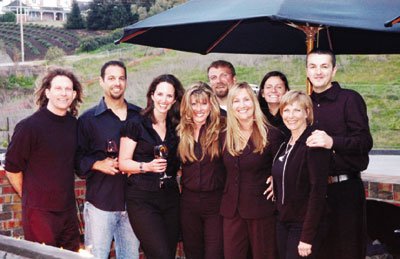I know many people, myself included, that become a bit
overwhelmed when it comes to buying and selecting wine.
I know many people, myself included, that become a bit overwhelmed when it comes to buying and selecting wine. There is no right or wrong way per se, but I do have some advice that might make your decision-making process a little easier. I will make a few statements and then elaborate on each point:
A. Fine wine does not have to be expensive. You do not have to drop a lot of dough if you are in the know. Many great wines can be found within your price range. If you have a Champagne appetite, but a beer budget, you may want to stay clear of the wine locked behind the glass cabinet! I have enjoyed $10 bottles as much as I have enjoyed wines that were significantly more expensive.
B. Do not be a slave to points and ratings. I probably sound like a broken record, but the wine industry puts too much emphasis on points and ratings, something we see in almost every store and trade publication. Your palate and preferences may differ from the folks rating all this wine – and there is nothing wrong with that. I have had people tell me they tried a popular, expensive, high-point scoring wine, but did not like it. They then question, “What is wrong with me?” Nothing is wrong with the way your palate responds to certain styles. The wine industry needs to quit supporting this wine-point rhetoric.
C. Discover what wines you like and drink them. There are literally thousands of wines made around the world. You should be able to find wine that you can afford and that you like to drink. Embrace diversity. Even after you find wines that you like, do not be afraid to try new ones according to the food you eat, the change of seasons, etc.
D. Seek the advice of friends and family. I like to read, but again, get intimidated by all the books I see out there. However, if a friend or family member suggests a book, my propensity is to rush out and get a copy. I trust their judgment and opinions, for they are clued in to what I like and dislike.
E. Cultivate a relationship with a wine merchant or retail shop. This can be the shortcut to new, different and soon-to-be familiar wines. A good merchant will make an effort to understand what you like, how adventurous your palate is and even what foods you normally consume. Provide feedback on the wines you did or did not like. That way, the merchant can get to know your preferences. Also, you can trust that the wine coming from the store has been meticulously cared for and stored properly.
F. Taste, taste, taste. Just looking at a bottle isn’t going to help you much. Visit a wine bar to get a sample of wines from different regions, try a glass of wine at a restaurant or seek the advice of the server/sommelier. A good professional should be able to guide you according to your budget (do not be afraid to state confidently what your budget is), the food you will be ordering or simply what wines they have found to be great tasting and great values.
G. Do not get caught up in “great years” or vintages. The critics again can be blamed for putting too much emphasis on certain years or vintages. Depending on your preferences, you may like “lesser” years even better – and you can save a whole lot of money in the process due to supply and demand.
H. Don’t think, drink. Enough said.
Cheers!













